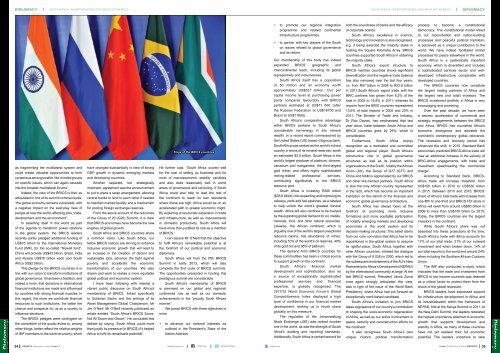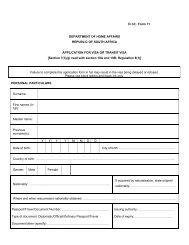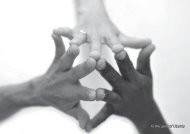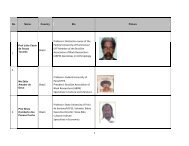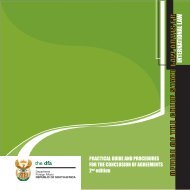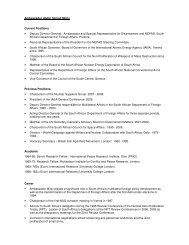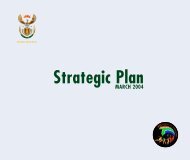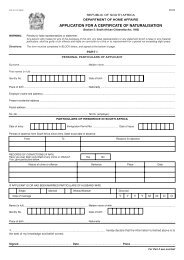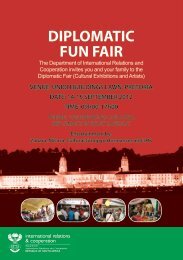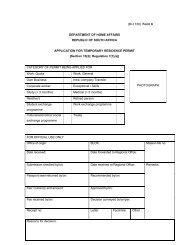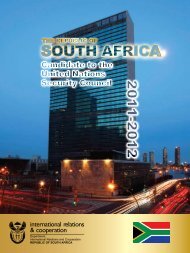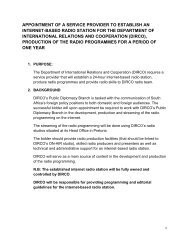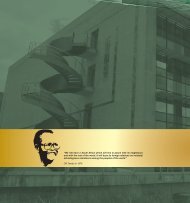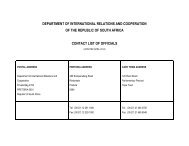UBUNTU Magazine Issue 1 - Department of International Relations ...
UBUNTU Magazine Issue 1 - Department of International Relations ...
UBUNTU Magazine Issue 1 - Department of International Relations ...
You also want an ePaper? Increase the reach of your titles
YUMPU automatically turns print PDFs into web optimized ePapers that Google loves.
DIPLOMACY<br />
SOUTH AFRICA – AN IMPORTANT BUILDING BRICK WITHIN BRICS<br />
SOUTH AFRICA – AN IMPORTANT BUILDING BRICK WITHIN BRICS<br />
DIPLOMACY<br />
Diplomacy<br />
as fragmenting the multilateral system and<br />
could create valuable opportunities to form<br />
consensus among smaller, like-minded groups<br />
on specific issues, which can again cascade<br />
into the broader multilateral forums”.<br />
Indeed, the view <strong>of</strong> the BRICS is that, as<br />
articulated in one <strong>of</strong> its summit communiqués,<br />
“the global economy remains vulnerable, with<br />
a negative impact on the everyday lives <strong>of</strong><br />
people all over the world, affecting jobs, trade,<br />
development and the environment”.<br />
In asserting itself in the world as part<br />
<strong>of</strong> the agenda to transform power relations<br />
in the global system, the BRICS leaders<br />
recently jointly pledged additional funding <strong>of</strong><br />
US$75 billion to the <strong>International</strong> Monetary<br />
Fund (IMF), for the so-called “firewall fund”.<br />
China will provide US$43 billion, Brazil, India<br />
and Russia US$10 billion each and South<br />
Africa US$2 billion.<br />
This pledge by the BRICS countries is in<br />
line with our vision to transform institutions <strong>of</strong><br />
global governance. It has been a tradition, and<br />
indeed a norm, that decisions in international<br />
financial institutions are made and influenced<br />
by countries with strong financial muscles. In<br />
this regard, the more we contribute financial<br />
resources to such institutions, the better the<br />
chance and prospects for us as a country to<br />
influence decisions.<br />
The BRICS pledges were contingent on<br />
the completion <strong>of</strong> the quota review to, among<br />
other things, better reflect the relative weights<br />
<strong>of</strong> IMF members in the world economy, which<br />
have changed substantially in view <strong>of</strong> strong<br />
GDP growth in dynamic emerging markets<br />
and developing countries.<br />
Another separate, but strategically<br />
important, agreement was the announcement<br />
to put in place a swap arrangement, allowing<br />
central banks to lend to each other if needed<br />
to maintain market liquidity and a mechanism<br />
for pooling foreign exchange reserves.<br />
From the above account <strong>of</strong> the outcomes<br />
<strong>of</strong> the Group <strong>of</strong> 20 (G20) Summit, it is clear<br />
that BRICS economies have become the new<br />
engines <strong>of</strong> global growth.<br />
South Africa and BRICS countries share<br />
a common vision. Like South Africa, our<br />
fellow BRICS nations are striving to enhance<br />
inclusive economic growth that will lead to<br />
an increase in the creation <strong>of</strong> decent and<br />
sustainable jobs, advance the fight against<br />
poverty and accelerate the economic<br />
transformation <strong>of</strong> our countries. We also<br />
dream and work to realise a more equitable<br />
global political and economic system.<br />
I have been following with interest a<br />
vibrant public discourse on South Africa’s<br />
membership <strong>of</strong> BRICS, linked specifically<br />
to Goldman Sachs and the writings <strong>of</strong> its<br />
Asset Management Global Chairperson, Mr<br />
Jim O’Neill. Mr O’Neill recently publicised an<br />
article entitled “South Africa’s BRICS Score:<br />
Not All Doom and Gloom”. He concluded this<br />
debate by saying “South Africa could more<br />
than justify its presence (in BRICS) if it helped<br />
Africa to fulfil its remarkable potential”.<br />
Flags <strong>of</strong> the BRICS countries<br />
He further said, “South Africa scored well<br />
for the cost <strong>of</strong> setting up business and for<br />
most <strong>of</strong> macroeconomic stability variables<br />
and also does reasonably well in some<br />
areas <strong>of</strong> governance and schooling. If South<br />
Africa could also help to lead the rest <strong>of</strong><br />
the continent to reach its own standards<br />
where these are high, Africa would be on an<br />
accelerated path to greater economic might.<br />
By exploring cross-border expansion in trade<br />
and infrastructure, as well as improvements<br />
in domestic productivity, South Africa will<br />
have more than justified its role as a member<br />
<strong>of</strong> BRICS.”<br />
I can assure Mr O’Neill that the objective<br />
to fulfil Africa’s remarkable potential is at<br />
the forefront <strong>of</strong> our political and economic<br />
diplomacy.<br />
South Africa will host the fifth BRICS<br />
Summit in early 2013, which will also<br />
complete the first cycle <strong>of</strong> BRICS summits.<br />
The opportunities presented in hosting this<br />
prestigious summit are considerable.<br />
South Africa’s membership <strong>of</strong> BRICS<br />
is premised on our global and regional/<br />
continental role as well as our domestic<br />
achievements in the “proudly South African<br />
manner”.<br />
We joined BRICS with three objectives in<br />
mind:<br />
• to advance our national interests as<br />
outlined in the President’s State <strong>of</strong> the<br />
Nation Address<br />
• to promote our regional integration<br />
programme and related continental<br />
infrastructure programmes<br />
• to partner with key players <strong>of</strong> the South<br />
on issues related to global governance<br />
and its reform.<br />
Our membership <strong>of</strong> this body has indeed<br />
expanded BRICS’ geographic and<br />
intercontinental reach, including its global<br />
representivity and inclusiveness.<br />
South Africa itself has a population<br />
<strong>of</strong> 50 million and an economy worth<br />
approximately US$527 billion. Our per<br />
capita income level at purchasing power<br />
parity compares favourably with BRICS<br />
partners estimated at US$11 000 (after<br />
the Russian Federation at US$16700 and<br />
Brazil at US$11845).<br />
South Africa’s comparative advantage<br />
within BRICS pertains to South Africa’s<br />
considerable non-energy in situ mineral<br />
wealth. In a recent report commissioned by<br />
the United States (US) based Citigroup bank,<br />
South Africa was ranked as the world’s richest<br />
country in terms <strong>of</strong> its mineral reserves, worth<br />
an estimated $2,5 trillion. South Africa is the<br />
world’s largest producer <strong>of</strong> platinum, chrome,<br />
vanadium and manganese, the third-largest<br />
gold miner, and <strong>of</strong>fers highly sophisticated<br />
mining-related pr<strong>of</strong>essional services,<br />
contributing significantly to the BRICS<br />
resource pool.<br />
South Africa is investing R300 billion<br />
($35,6 billion) into expanding and improving its<br />
railways, ports and fuel pipelines, as a catalyst<br />
to help unlock the world’s greatest mineral<br />
wealth. Africa will also continue to be buoyed<br />
by the exploding global demand for oil, metals,<br />
minerals, food, and other natural resources.<br />
Likewise, the African continent, which is<br />
arguably one <strong>of</strong> the world’s largest unexplored<br />
resource basins, has abundance <strong>of</strong> riches;<br />
including 10% <strong>of</strong> the world’s oil reserves, 40%<br />
<strong>of</strong> its gold ore and 95% <strong>of</strong> platinum.<br />
The demand from BRICS countries for<br />
these commodities has been a critical source<br />
to support growth on the continent.<br />
South Africa’s financial market<br />
development and sophistication, also as<br />
a source <strong>of</strong> exceptionally sophisticated<br />
pr<strong>of</strong>essional services and financial<br />
expertise, is globally recognised. The<br />
2011/12 World Economic Forum’s Global<br />
Competitiveness Index displayed a high<br />
level <strong>of</strong> confidence in our financial market<br />
development, ranking us in fourth place<br />
globally on this measure.<br />
The regulation <strong>of</strong> the Johannesburg<br />
Stock Exchange (JSE) was ranked number<br />
one in the world, as was the strength <strong>of</strong> South<br />
Africa’s auditing and reporting standards.<br />
Additionally, South Africa is ranked second for<br />
both the soundness <strong>of</strong> banks and the efficacy<br />
<strong>of</strong> corporate boards.<br />
South Africa’s excellence in science,<br />
technology and innovation is also recognised,<br />
e.g. it being awarded the majority stake in<br />
hosting the Square Kilometre Array. BRICS<br />
countries supported South Africa in obtaining<br />
the majority stake.<br />
South Africa’s export structure to<br />
BRICS member countries shows significant<br />
diversification and the negative trade balance<br />
has also narrowed over the last four years,<br />
i.e. from R57 billion in 2008 to R22,8 billion<br />
in 2011.South Africa’s export trade with the<br />
BRIC partners has grown from 6,2% <strong>of</strong> the<br />
total in 2005 to 16,8% in 2011; whereas its<br />
imports from the BRIC countries represented<br />
13,6% <strong>of</strong> total imports in 2005 and 20% in<br />
2011. The Minister <strong>of</strong> Trade and Industry,<br />
Dr Rob Davies, has emphasised that last<br />
year alone, trade between South Africa and<br />
BRICS countries grew by 29%, which is<br />
considerable.<br />
Furthermore, South Africa enjoys<br />
recognition as a dedicated and committed<br />
global and regional player. South Africa’s<br />
constructive role in global governance<br />
structures as well as its position within<br />
organisations <strong>of</strong> the South, notably the African<br />
Union (AU), the Group <strong>of</strong> G77 (G77) and<br />
China and NAM is appreciated by our BRICS<br />
and other like-minded partners. South Africa<br />
is also the only African country represented<br />
in the G20, which has become an important<br />
institution on the reform <strong>of</strong> the financial and<br />
economic global governance architecture.<br />
South Africa has always been at the<br />
forefront <strong>of</strong> promoting more inclusive<br />
formations and more equitable participation<br />
<strong>of</strong> notably emerging markets and developing<br />
economies in the world system and its<br />
decision-making structures. This belief stems<br />
from our core conviction that Africa has to be<br />
repositioned in the global system to assume<br />
its rightful place. South Africa, together with<br />
other African countries, initiated the dialogue<br />
with the Group <strong>of</strong> 8 (G8) in 2000, which led to<br />
the subsequent endorsement <strong>of</strong> the AU’s New<br />
Partnership for Africa’s Development (NEPAD)<br />
by the international community at large. At the<br />
last BRICS summit, President Jacob Zuma<br />
once again strongly articulated this view,<br />
also in light <strong>of</strong> the issue <strong>of</strong> the World Bank<br />
Presidency, where Africa had put forward an<br />
exceptionally merit-based candidate.<br />
South Africa’s invitation to join BRICS<br />
takes cognisance <strong>of</strong> our country’s contribution<br />
to shaping the socio-economic regeneration<br />
<strong>of</strong> Africa, as well as our active involvement in<br />
peace, security and reconstruction efforts on<br />
the continent.<br />
It also recognises South Africa’s own<br />
unique historic political transformation<br />
process to become a constitutional<br />
democracy. This constitutional model linked<br />
to our reconciliation and nation-building<br />
processes and peaceful political transition,<br />
is perceived as a unique contribution to the<br />
world. We have indeed facilitated similar<br />
processes for peace elsewhere in the world.<br />
South Africa is a systemically important<br />
economy, which is diversified and includes<br />
a sophisticated services sector and welldeveloped<br />
infrastructure comparable with<br />
developed countries.<br />
The BRICS countries now constitute<br />
the largest trading partners <strong>of</strong> Africa and<br />
the largest new (not total) investors. The<br />
BRICS investment portfolio in Africa is very<br />
encouraging and promising.<br />
Over the past decade, we have seen<br />
a seismic acceleration <strong>of</strong> commercial and<br />
strategic engagements between the BRICS<br />
and Africa. BRICS has nourished Africa’s<br />
economic emergence and elevated the<br />
continent’s contemporary global relevance.<br />
The recession and recovery period has<br />
enhanced this shift. In 2010, Standard Bank<br />
economists predicted BRICS-Africa trade will<br />
“see an additional increase in the velocity <strong>of</strong><br />
BRIC-Africa engagements, with trade and<br />
investment spearheading the commercial<br />
charge”.<br />
According to Standard Bank, BRICS-<br />
Africa trade will increase threefold, from<br />
US$150 billion in 2010 to US$530 billion<br />
in 2015. Between 2010 and 2015, BRICS’<br />
share <strong>of</strong> Africa’s total trade will increase from<br />
one-fifth to one-third and BRICS FDI stock in<br />
Africa will swell from around US$60 billion in<br />
2009 to more than US$150 billion by 2015.<br />
Today, the BRICS countries are the largest<br />
investors in the continent.<br />
While South Africa’s share was not<br />
absorbed into these projections at the time,<br />
South Africa’s trade with Africa accounts for<br />
17% <strong>of</strong> our total trade, 21% <strong>of</strong> our outward<br />
investment and when broken down, 14% <strong>of</strong><br />
our total exports to the world and around 24%<br />
when including the Southern African Customs<br />
Union.<br />
The IMF also conducted a study, which<br />
indicated that the trade and investment from<br />
BRICS to low-income countries was deemed<br />
as a critical factor to protect them from the<br />
shock <strong>of</strong> the global recession.<br />
BRICS leaders have expressed support<br />
for infrastructure development in Africa and<br />
its industrialisation within the framework <strong>of</strong><br />
NEPAD, first at the Sanya Summit in 2011. At<br />
the New Delhi Summit, the leaders reiterated<br />
the highest importance attached to economic<br />
growth that supports development and<br />
stability in Africa, as many <strong>of</strong> these countries<br />
have not yet realised their full economic<br />
potential. The leaders undertook to take<br />
34 <strong>UBUNTU</strong> diplomacy in action <strong>Issue</strong> 1 www.dirco.gov.za DIRCOza<br />
@theDIRCOza thedircoza<br />
<strong>Issue</strong> 1 diplomacy in action <strong>UBUNTU</strong> 35<br />
Diplomacy


